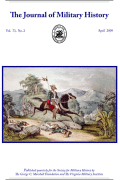The British colonial regime in India was heavily dependent on the Indian Army, whose rank and file were Indians but whose officers were British. Despite the apathy of the Indian populace and the hostility of the Indian political parties, the Indian Army remained loyal to its colonial masters during World War II.
This article examines the extent of that loyalty and the reasons behind it. Focusing principally on the Indian units that fought in Burma, it analyzes combat motivation and loyalty throughout the war. The article also considers the British elite's concern about the Indian soldiers' loyalty and whether it would change during postwar demobilization.







